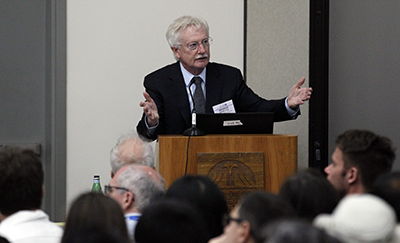NIAAA Director Describes ‘Dark Side of Addiction,’ Hope for Future Treatments

Alcohol and drug addiction appears to impair not only brain areas critical to reward, but over time also sensitizes other brain areas involved in negative emotional states—dysphoria, anxiety, and irritability—when access to the drug or stimulus is prevented.
“This is what I have called the dark side of addiction,” said George F. Koob, Ph.D. (pictured above), director of the National Institute on Alcohol Abuse and Alcoholism (NIAAA).
In a lecture he presented yesterday, Koob described recent research indicating that the negative emotional states experienced by addicts and alcoholics when they do not have access to their addictive substance are an integral part of the addictive process.
These negative emotional states are activated in parts of the brain outside the reward circuit that become sensitized as an individual’s addiction increases over time and appear to involve a number of stress-related neurotransmitters that cause anxiety and irritability when an addict’s drug of choice is denied or not available.
These stress-related neurotransmitters include corticotropin-releasing factor (CRF), norepinephrine, dynorphin, vasopressin, glucocorticoids, or other neuroimmune factors, among others.
“Compulsive drug taking produces a reduction in reward neurotransmission in the basal ganglia and a recruitment of brain stress neurotransmission in the extended amygdala that contribute to dysphoric-like responses and a negative emotional state,” Koob said. “We believe that these brain systems mediating negative emotional states are activated by acute excessive drug intake, sensitized during repeated withdrawal, and persist into protracted withdrawal.”
In combination with social and environmental cues that trigger the desire to use or drink, these negative emotional states drive drug seeking and relapse in addiction, Koob said. He described an individual who has faced workplace consequences due to alcoholism or addiction; driving home he feels humiliated and agitated. “He sees his favorite bar, and the lights go off,” Koob said.
Koob is an internationally recognized expert on alcohol and stress and the neurobiology of alcohol and drug addiction. As director of NIAAA, he oversees a broad portfolio of alcohol research ranging from basic science to epidemiology, diagnostics, prevention, and treatment.
He began his career investigating the neurobiology of emotion, particularly how the brain processes reward and stress. He subsequently applied basic research on emotions, including on the anatomical and neurochemical underpinnings of emotional function, to alcohol and drug addiction, significantly broadening knowledge of the adaptations within reward and stress neurocircuits that lead to addiction. This work has advanced the understanding of the physiological effects of alcohol and other substance use and why some people transition from use to misuse to addiction, while others do not.
Koob’s research suggests hope for the development of medications that can diminish negative emotional states associated with withdrawal from alcohol or drugs, and he noted that anti-stress neurotransmitters such as oxytocin have shown promise. But he cautioned against hoping for a magic bullet. “I don’t think medication can ever cure addiction,” he said. “Rather they may be one piece in an armamentarium. Behavioral therapies, which many of you provide, will be needed to help patients achieve homeostasis in the rest of their lives.”
(Image: David Hathcox)
|
|
|
|
|


